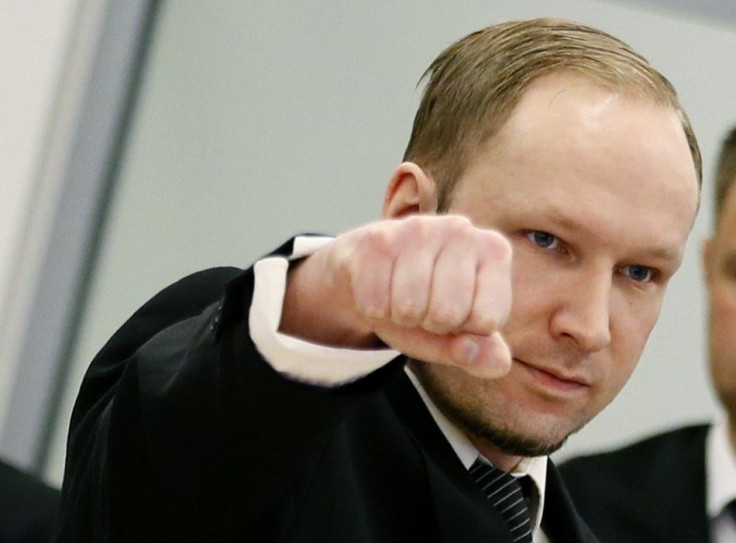Breivik Insists Knights Templar Is Real

In the third day of his terror/mass murder trial on Wednesday, Norwegian killer Anders Behring Breivik was pressed about his links to far-right extremist groups and the mysterious Knights Templar.
Police have found no evidence that such a crusader group exists, but Breivik insisted he was one of many members of a European, anti-Muslim militia.
The 33-year-old did concede that the Knights Templar was not an organization in a conventional sense, according to the Press Association, adding that it consists of independent cells ... and therefore in the long term will be a leaderless organization. He said there were more than 15 members in Europe, but would not elaborate.
Breivik first described the Knights Templar in his 1,500-page manifesto 2083: A European Declaration of Independence, in which he called the group a nationalist military order and military/criminal tribunal. He designed and modeled uniforms, badges, medals, insignia, and epaulets for the military. In the manifesto, which was distributed to about 1,000 people immediately before Breivik detonated a car bomb in Oslo, he also tried to recruit Justiciar Knights for the crusade.
As a Justiciar Knight you will go into history as one of the most influential individuals of your time, Breivik wrote in 2083.
Despite the line of questioning from prosecutors, Breivik skirted away from the topic. He did say that his code name was “Sigurd the Crusader,” but refused to comment on other Templar members, saying it is not in my interest to shed light on details that could lead to arrests.
Breivik has been charged with acts of terrorism under section 147 A and B of Norway's penal code, as well as with 77 counts of murder and 42 counts of attempted murder. Breivik has admitted that he set off the car bomb outside Norway's government headquarters on July 22 and then drove to a summer camp on nearby Utoya Island, where he shot 69 people, most of them teenagers. But he has pled not guilty to the charges, saying on Monday that they were acts of necessity and that he would have done it again.
Terrorism charges carry a maximum 21-year sentence in Norway; however, the court could extend his sentence once it's completed if Breivik is deemed a danger to society. Additionally, the court's final determination on Breivik's sanity will be of great importance -- if declared insane, Breivik could be institutionalized for the rest of his life rather than imprisoned.
During proceedings on Wednesday, Breivik himself said that a 21-year maximum sentence was unacceptable and pathetic, according to the Associated Press.
There are only two just and fair outcomes of this case. One is an acquittal, the other is capital punishment, he told the court.
Breivik was also questioned about his links to other far-right groups on Wednesday. During the initial investigation last summer, police looked into possible connections to groups like the English Defence League, but found little more than a few internet postings. On Wednesday, Breivik said that he was actually inspired by Serbian fighters who died in the 1999 bombing in Kosovo, whom he claimed were the best example of freedom-fighters since the Nazis.
As regards the identity [of the Knights Templar], the essence was to try to distance oneself sufficiently from National Socialism because it was quite blood-stained. We felt it completely essential to do so. For the extreme right to... ever be able to prevail in Europe in the future, one had to distance oneself from the old school ideology. One would choose a new identity ... in a way, imported from Serbia.
Breivik said that he traveled to Liberia to meet with a Serb nationalist who was wanted for war crimes. Police believe this was a reference to Milorad Ulemek, who assassinated Prime Minister Zoran Djindjic, but question whether the meeting actually happened, according to the Guardian.
The police do not trust my statement, Breivik said.
They do not think that there is a Serb. They do not think there is a person who was my English contact, he added, referring to an Englishman named in the manifesto as 'Richard the Lionhearted.'
© Copyright IBTimes 2025. All rights reserved.





















